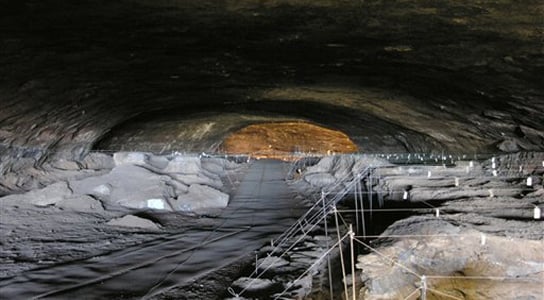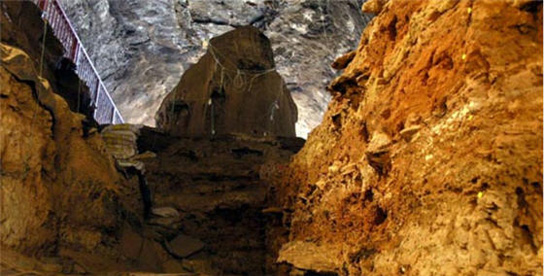
Ash was discovered in a South African cave, and this indicates that humans were cooking with fire one million years ago. This is the earliest use of fire but experts say that more proof is needed to conclude that humans were cooking with fire regularly.
Francesco Berna, an archaeologist, at Boston University in Massachusetts, and his team found ash that was composed of burnt grass, leaves, brush, and bone fragments in sediments 30 meters deep inside Wonderwerk Cave, in Northern Cape, South Africa. This cave is one of the oldest known sites of human habitation and shows traces of having been lived in from almost two million years ago.

For now, it’s impossible to say for certain which species of hominin inhabited the cave one million years ago, but clues indicate that it was probably Homo erectus. The ash was well preserved and has jagged edges, implying that it was not burned elsewhere or blown into the cave, which is usually indicated by worn edges.
There were no traces of bat guano, which led the researchers to conclude that the fire was created by hominins and not started inadvertently by nature. They published their findings in the journal Proceedings of the National Academy of Sciences.
The first humans used cooking to make food easier to chew and digest. This allowed them to get more energy from the same amount of food, and spend less time foraging. It has been difficult to pinpoint the exact period when humans made this leap.

Evidence of burning is quickly and easily destroyed by erosion. Other burned remains have been dated 1 million to 1.5 million years ago, in Swartkrans in South Africa, and 700,000 to 800,000 years ago in Gesher Benot Ya`aqov but both of these sites were exposed, implying that lightning could have ignited these fires. This would have been impossible in the Wonderwerk Cave.
The earliest unequivocal evidence for fire-making, cooking, and hearths dates back 400,000 years. Further searches are needed to prove that hominins used fire in this way to equivocally conclude that fire was in use one million years ago.
Reference: “Microstratigraphic evidence of in situ fire in the Acheulean strata of Wonderwerk Cave, Northern Cape province, South Africa” by Francesco Berna, Paul Goldberg, Liora Kolska Horwitz, James Brink, Sharon Holt, Marion Bamford and Michael Chazan, 2 April 2022, Proceedings of the National Academy of Sciences.
DOI: 10.1073/pnas.1117620109
Never miss a breakthrough: Join the SciTechDaily newsletter.
19 Comments
It is impossible for humans ,that too known for their cooking talents to have lived 2 million years ago.. It could be remnants of forest burns. Thank You.
Forest burns? In a cave? Idiot, free yourself.
It’s in a cave
Hello! stupid big mouthie! The article states that a million year old ashes were found in the cave. No scientist will conclude from a single result in observation. Do you know that then only ‘HOMO ERECTUS’ a species like monkeys were living in that period about a million years ago.We belong to HOMO SAPIENS, genre. NO fool will say that forest burns happened inside the caves unless it is physically carried there. Monkeys are capable of carrying the fire stick anywhere. The ancient human ancestor “china man” is only one hundred thousand years old. The man who knew the usage of fire came only later on during old stonage people. You can even stupidly imagine that even Dinosaurs which lived 25 millions years ago knew the usage of fire for cooking. Monkeys don’t need cooked food and Monkeys need not know everything that homo sapiens do.Thank You.
Remove the blinkers on your eyes.
Evolution is a theory which infact scientists are still researching hard to prove. Their findings in most cases always shed more light or sometimes correct the incorrect conclusions made earlier. You need allow your mind to make you stay a fossil otherwise the researchers will come for yee
Evolution is a fact: everything from viruses to bacteria to jellyfish and humans do it. TheoriES of evolution are the only thing you can argue about – and quite a few of those are pretty well nailed down. And more evidence means more nailing down, until…the doubters can doubt no more!!
Oh, so many things wrong with this…!
1. No proof that monkeys – as in, non-hominid primates – have ever used fire.
2. “China man” is not the human ancestor – and there are H sapiens fossils older than that. Humans came out of Africa: live with it.
3. There were no dinosaurs 25 million years ago. 66 million ago, yes – until the large chunk of rock that resulted in their extinction barrelled in.
4. H erectus was no more a monkey than we are. Some examples notwithstanding….
God I hate overly smarmy grown men.. such a female characteristic especially since there’s always some part of their self reinforcing BS that’s false.
-Not all dinosaurs died off. Surely you’ve heard of birds. Google it.
-The ‘out of Africa theory’ has been debunked with earlier finds from Greece and Ukraine
-Some monkeys (and specially chimps) have an ‘almost human grasp of fire’ and have been taught to even cook with it.. Google it
-‘I’m not a monkey because I’m CLEARLY smarter than these other posters who are’ lololol are you three years old? I doubt you can keep cake out of your mouth even once.
Thank you. Succinctly put. I find it hard to explain how so many unqualified “experts” know so much! There hardly seems any point in accademics wasting so much ime studying and discovering so much when all that’s really needed is big-footed opinion 🤔 🙄 … 🤐😉
Dinosaurs went extinc 65 million years ago. Perhaps you have mixed up some paleontologists dates mixed up? I sometimes do also. Thank you.
Paleolithic. I hate autocorrect.
But some imbeciles and extreme idiots think that The World exists for NO MORE than…. 5000 years. Why nature produces such idiots??????
Very humorous thoughts going back and forth here. 25 million year old Dinos and monkeys with fire sticks Oh My.
Unfortunately the interwebs have provided a wealth of knowledge for the masses, along with a plethora of misinformation for the unwary. Now opinions expressed are lacking depth or scholarly acumen. I look forward to the generosity of professionals expressing their views.
Evolution is, in fact, among the Most Solidly Proven of all scientific THEORIES –
& please bear in mind, in science a “theory” is not a symonym for HYPOTHESIS.
Gravity is a Theory.
Emtropy is a Theory.
Scientific theories are not only widely accepted as fact, but have been proven by multiple experiments. Research must be replicable – anything that cannot be repeated, is discarded.
If evolution is incorrect, pray tell us, how do modern humans share over 98% of bonobo DNA?
Moreover, how do we share over 65% of domestic dog DNA?
Luckily for today’s Homo sapiens, the common fruit fly, Drosophila melanogaster, has a genome 60% identical, & even better, ~75% of the genes causing human diseases have homologues in D. melanogaster, making these tiny, easy to maintain creatures an excellent lab model for studies of human disease.
Much of the conceptual conflict between non-scientists and researchers thoroughly trained in the Scientific Method arises from the formal use of the word “Theory” and the colloquial (i.e., conversational) use of the same word. When a non-scientist uses the word “theory”, they typically suggest the perspective that a scientist would describe as a “hypothesis” (a guess, a proposed chain of causality to explain observations). In the more formal (i e., scientific) use of the word “Theory”, the connotation is an internally consistent and coherent set of ideas that tie together a group of facts, and, most importantly, is undergirded by physical *evidence* (not ideology, mythology, or religious dogma).
All serious Scientific Theories include propositions and implications that are subject to refutation by experimentation and contraindicating evidence. The most famous in modern history is Einstein’s conjecture that gravity is not a “force”, per se, but rather a consequence of mass distorting the structure of space (“space-time”), thereby altering the trajectory of matter or energy in proximity to that distortion. Light, famously, has no mass, and therefore should not “feel” any gravitational influence when passing near a mass. The observation that starlight — that should have been hidden by the disc of the sun during the solar eclipse in May 1919 — was, in fact, visible, its trajectory through space “bent” by the gravitational field of the sun, established the Theory of Relativity as an evidence-based explanation of the ersatz [“Newtonian”] “attraction” observed between objects with mass. Einstein’s hypothesis that mass distorts space-time was elevated to established and reliable scientific theory because it made testable predictions and those predictions were verified by observation of relevant phenomena.
ALL intellectually honest scientists will concede that *all* scientific theories are subject to reconsideration, revision, and replacement if and when overwhelming evidence demonstrates that the existing theory is insufficient to explain anomalous observations and a new, more comprehensive Theory resolved the apparent dissonance. Newton’s observational Laws (mathematical descriptions) work perfectly well in all human-scale conditions, but under conditions of extreme mass or extreme (near-liminal) velocities, Einstein’s Theories provide more complete and reliably predictive descriptions of the observed data under those non-human-scale conditions.
Current trends of thought (Evolutionary Theiry) regarding the diversification of hominin species and the natural selection of Homo Sapiens Sapiens through time — *and interbreeding* — provides the best available explanation for the evidence found in the fossil and archeological records. As that record expands and deepens, the details of Human Evolution and global migration will likely become more nuanced, perhaps even undergoing some major revisions. But the essential narrative that slow, yet sometimes punctuated, genetic change, plus interbreeding with closely related hominin species led to contemporary Homo Sapiens Sapiens individuals is a durable and internally consistent explanation for our emergence from pre-human primate genetic stock.
Most resistance to this narrative seems to be rooted in either fear-based, religious dogma and/or an inability to contemplate gradual change across spans of so-called “Deep Time” — intervals that span hundreds of thousands and millions (or even billions) of years. These biases seem rooted in an expectation that all events that affect/affected human existence must somehow be anchored in a few hundred or a few thousand human life spans. Once one releases this self-imposed, temporal boundary on the plausible processes of biological change, then the evolutionary narrative for the emergence and expansion of our species across this planet becomes not only a tenable conceptual framework but also the most logical one …with manifestations that we are beginning to recognize in our jumble genetic inheritance.
As physicist Richard Feynman once observed, the fact that a sufficiently large, mineral sphere can hold oceans of water on its top bottom, and all sides, and we are illuminated by a “fire” fueled by the fusion of hydrogen atoms into helium atoms accomplished under the pressure and heat of immense gravity, is a far more fascinating explanation of the universe in which we live …as opposed to a great unquenchable flame being drawn by a Chariot of the god Apollo around a flat disc that you fall off of if you sail too close to the edge! The scientific explanation also has the useful quality of being true, which opens up other new vistas of discovery. Future revisions and refinements are all but guaranteed. But it is incredibly useful to reconcile ourselves to the realization that our species is just emerging from a cognitive “childhood” dominated by magical thinking and the folk tales and fairy tales our ancestors created to explain a world of wonders beyond their comprehension. They could see the phenomena around them but the mechanisms of plate tectonics, physics, chemistry, organic chemistry, genetics, and evolution were invisible and unimaginable to them. Our species only entered its Adolescence of Discovery about 500 years ago. We ~may~ be entering our late adolescence, wherein we realize that we are not the center of the Universe and everything isn’t about *us*! If we can survive the egotism and recklessness of this late adolescence, ours ~may~ …eventually… become an interstellar species. But first, we must learn to live within our environmental limitations and learn to tolerate those with whom we disagree. If we can agree to allow research, data, and verifiable facts guide our decisions …rather than greed, in-group bias, and religious or ideological dogma… then we may have a chance. Otherwise, our species will become just another layer in the geological record, until the sun swallows the inner planets, vaporizing the cradle of our species and all the material tokens to which we attribute so much value.
Our species could have a few hundred thousand more years to “grow up”, grow out of our egotism, and “move out of our ancestral home”, but recent trends don’t bode well for that outcome. Fortunately, for now, the necessary choices remain within our grasp …*if* we are wise enough to choose them. Time will tell.
Please forgive the grammatical and typographic errors
Please pardon the typographical and grammatical errors.
Please forgive the grammatical and typographic errors